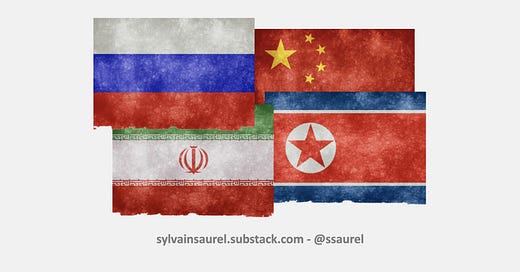Russia, China, North Korea, Iran – The Emerging Cartel of the Sanctioned Wants to Oppose U.S. Domination
The West must prepare for this confrontation if it wants to preserve peace in the future.
The United States of America is the world's leading superpower. Period.
No one can dispute that now, even if Xi Jinping's China aims to take that unofficial title from America by 2049 for the 100th anniversary of the People's Republic of China.
With this status, America has increasingly resorted to economic sanctions in its foreign policy over the last th…
Keep reading with a 7-day free trial
Subscribe to Sylvain Saurel’s Newsletter to keep reading this post and get 7 days of free access to the full post archives.




